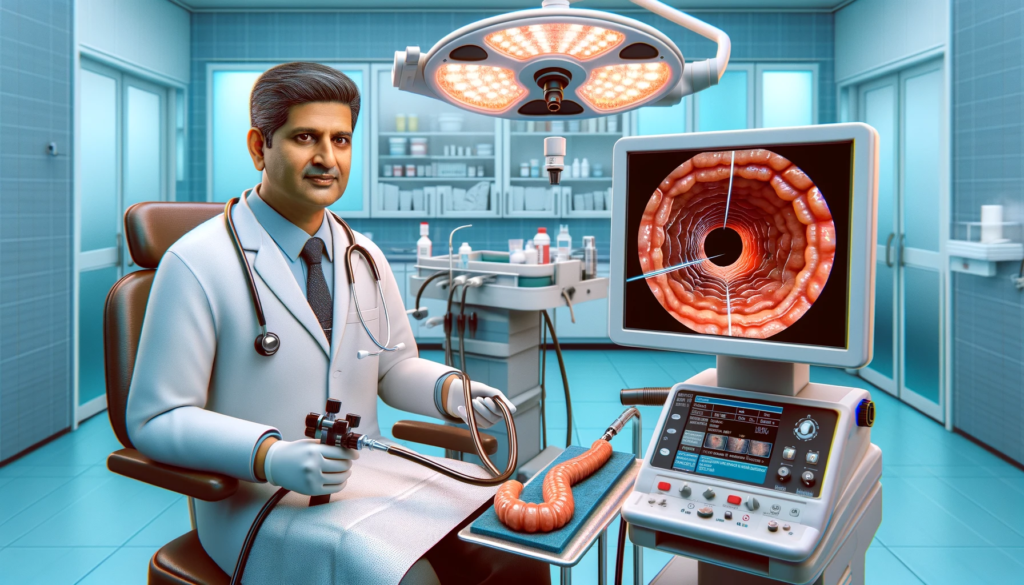Table of Contents
ToggleGastrointestinal (GI) cancer remains a major health challenge across the globe, and proactive screening is crucial for improving patient outcomes and survival rates. Colonoscopy, a specialized diagnostic procedure, stands out as a critical tool in the early detection and management of GI cancers. This detailed article explores the Role of Colonoscopy in GI Cancer, prominently featuring the expertise of Dr. Kapendra Shekar Amatya, a distinguished breast and gastrointestinal surgeon from Nepal.
What is Colonoscopy?

Colonoscopy is a medical procedure used to examine the inner lining of the colon and rectum using a flexible, camera-equipped instrument known as a colonoscope. This test is primarily recommended for the detection of colorectal cancers and precancerous lesions, serving as a preventive measure against the progression of GI cancer.
The Role of Colonoscopy in GI Cancer Detection
The value of colonoscopy lies in its ability to detect abnormalities in the colon and rectum before they develop into full-blown cancer. Early detection through colonoscopy significantly enhances treatment efficacy and can dramatically reduce mortality rates associated with colorectal cancer. This is especially true for individuals at increased risk, such as those over 50 or with a family history of the disease.
Dr. Kapendra Shekar Amatya, a leading authority on surgical oncology, consistently advocates for regular colonoscopy screenings. He states, “Colonoscopy is not just a diagnostic tool; it is a lifesaving intervention that can drastically alter patient outcomes by catching GI cancer in its nascent stages.”
Dr. Kapendra Shekar Amatya: A Pillar of Surgical Excellence
Dr. Amatya is not only celebrated as the best breast cancer surgeon in Nepal but also excels in gastrointestinal surgery. His medical journey commenced after he graduated with honors from Beijing Medical University in 1999, where he studied under a full scholarship. He gained initial experience as a Medical Officer at Bir Hospital and B.P. Koirala Memorial Hospital before returning to Beijing Medical University to complete his MS, again on scholarship, in 2004.
His subsequent tenure as a Full-time Registrar at B.P. Koirala Memorial Cancer Hospital in Bharatpur, Chitwan, was followed by extensive practice at various prominent cancer institutions, including the National Cancer Hospital and Bhaktapur Cancer Hospital. Since 2015, Dr. Amatya has been the Consultant Surgical Oncologist and Head of the Department of Surgical Oncology at Nepal Cancer Hospital and Research Center, where he applies over a decade of specialized surgical experience to improve patient care.
The Comprehensive Benefits of Colonoscopy
- Early Detection and Diagnosis: Colonoscopy allows for the early detection of colon polyps and cancer, often before symptoms manifest.
- Increased Accuracy: It provides a clear and direct view of the colon, offering superior accuracy compared to other diagnostic tests.
- Cancer Prevention: The removal of benign or precancerous polyps during a colonoscopy can actually prevent the development of colorectal cancer.
Preparing for a Colonoscopy
Dr. Amatya emphasizes the importance of proper preparation for a colonoscopy, which typically involves a special diet and the use of laxatives to clear the colon. This preparation ensures that the colonoscope can provide a clear view of the colon walls, allowing for accurate assessment and treatment.
“Many patients feel anxious about undergoing a colonoscopy, but with modern sedation and pain relief methods, the procedure is generally well-tolerated and can be life-saving,” explains Dr. Amatya.
Conclusion
The role of colonoscopy in the detection and prevention of GI cancer is invaluable. As per Dr. Kapendra Shekar Amatya, timely and expertly conducted colonoscopies can significantly impact survival rates for patients at risk of GI cancer. For those considering this crucial screening, Dr. Amatya’s combination of deep expertise in gastrointestinal surgery and a compassionate approach to patient care makes him an ideal choice for ensuring the best possible health outcomes.Remember, the power of prevention lies in early detection. Schedule your colonoscopy today and take a vital step towards safeguarding your health against GI cancer.


